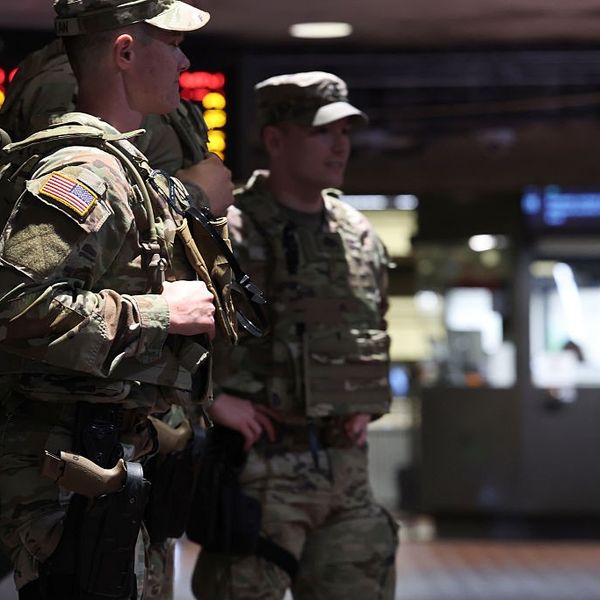
Senator Tim Kaine (D-Va.) was unanimously criticized by Senate Democrats for urging a Congressional vote on an expanded U.S. war in Iraq and Syria. Photo taken June 27, 2007. (Photo: Elvert Barnes)
When It Comes to War in Iraq and Syria, Senate Dems Prefer No Congressional Vote
Speaking anonymously to The Hill, Senate Democrats' aides blast Senator Tim Kaine (D-Va.) for demanding congressional vote on expanding U.S. military operations against ISIS.
Numerous Senate Democrats oppose bringing military operations in Iraq and Syria to a vote before Congress because they think going on the record as for or against will be harmful to their bids for office during an election season, The Hill reported Wednesday. Critics slammed this reluctance to take a position as a sign that cowardice and self gain--not principle--rule the legislature.
Senator Tim Kaine (D-Va.) has been vocally pushing for President Obama to put the expanding U.S. military attacks on ISIS in Iraq and Syria to a vote before Congress, as required by the War Powers Resolution. In a press statement released Monday, Kaine stated, "I do not believe that our expanded military operations against ISIL are covered under existing authorizations from Congress. The 2001 Authorization for Use of Military Force does not apply, and the Administration has testified that the 2002 Iraq war authorization is obsolete and should be repealed."
But Democratic Senators' aides, none of whom went on the record, told journalists Alexander Bolton and Amie Parnes that a congressional vote would be a political liability. The comments were captured in The Hill article:
"Asking anybody to take that vote within two months of an election is just stupid. Why would you put people in that position?" said a Senate Democratic aide.
A vote to authorize Obama to strike at Islamic militants in Iraq and Syria beyond the 60-day window set out by the War Powers Resolution would be a de facto referendum on the president, according to another aide.
"I think it's dumb," said a second Democratic aide. "The less the president is in the news with anything right now, the better."
But critics say that now--when the U.S. is currently expanding its war in Iraq and Syria--is exactly the time when presidential powers need to be checked. "The fact that these unnamed people are carping at Kaine and acting like there's something wrong with him for not acting as enabler of their cowardice shows the struggle that we need to wage if we want to have democratic control," Robert Naiman, policy director for Just Foreign Policy, told Common Dreams.
Kaine's position is not new. He had previously worked with Senator John McCain to "reform the War Powers Resolution in a way that lays out a clear consultative process between Congress and the President on whether and when to engage in military action," according to a statement released from Kaine's office. However, The Hill notes that McCain has held back on demanding congressional authorization of military strikes on ISIS because, according to a Democratic aide, this could get in the way of U.S. bombings.
"That way of thinking is prevalent in Washington across the political spectrum," said Naiman. "First you decide whether you support the war. If you support the war, you only support authorization if you think authorization is guaranteed. This is an unprincipled position."
Since August 8, the U.S. has carried out nearly 100 air strikes across Iraq and currently has nearly 1,000 U.S. military service members deployed to the country. Public information about the attacks--including the military branches carrying them out, the civilians and combatants killed, and the role of private contractors--remains scarce. Furthermore, President Obama's stated aims for the strikes have shifted throughout the month--from assisting refugees to protecting U.S. personnel to "eradicating" the "cancer" of ISIS. Meanwhile, U.S. drones are currently conducting surveillance flights over Syria, in what many warn is a sign of U.S. air strikes in that country as well.
"We are a little over two weeks into air strikes," Stephen Miles of Win Without War told Common Dreams, explaining that his organization is currently organizing to stop U.S. attacks on Iraq and prevent air strikes in Syria. "If Congress doesn't do anything until after the election, we will be a few months into a military intervention," he said.
An Urgent Message From Our Co-Founder
Dear Common Dreams reader, The U.S. is on a fast track to authoritarianism like nothing I've ever seen. Meanwhile, corporate news outlets are utterly capitulating to Trump, twisting their coverage to avoid drawing his ire while lining up to stuff cash in his pockets. That's why I believe that Common Dreams is doing the best and most consequential reporting that we've ever done. Our small but mighty team is a progressive reporting powerhouse, covering the news every day that the corporate media never will. Our mission has always been simple: To inform. To inspire. And to ignite change for the common good. Now here's the key piece that I want all our readers to understand: None of this would be possible without your financial support. That's not just some fundraising cliche. It's the absolute and literal truth. We don't accept corporate advertising and never will. We don't have a paywall because we don't think people should be blocked from critical news based on their ability to pay. Everything we do is funded by the donations of readers like you. The final deadline for our crucial Summer Campaign fundraising drive is just days away, and we’re falling short of our must-hit goal. Will you donate now to help power the nonprofit, independent reporting of Common Dreams? Thank you for being a vital member of our community. Together, we can keep independent journalism alive when it’s needed most. - Craig Brown, Co-founder |
Numerous Senate Democrats oppose bringing military operations in Iraq and Syria to a vote before Congress because they think going on the record as for or against will be harmful to their bids for office during an election season, The Hill reported Wednesday. Critics slammed this reluctance to take a position as a sign that cowardice and self gain--not principle--rule the legislature.
Senator Tim Kaine (D-Va.) has been vocally pushing for President Obama to put the expanding U.S. military attacks on ISIS in Iraq and Syria to a vote before Congress, as required by the War Powers Resolution. In a press statement released Monday, Kaine stated, "I do not believe that our expanded military operations against ISIL are covered under existing authorizations from Congress. The 2001 Authorization for Use of Military Force does not apply, and the Administration has testified that the 2002 Iraq war authorization is obsolete and should be repealed."
But Democratic Senators' aides, none of whom went on the record, told journalists Alexander Bolton and Amie Parnes that a congressional vote would be a political liability. The comments were captured in The Hill article:
"Asking anybody to take that vote within two months of an election is just stupid. Why would you put people in that position?" said a Senate Democratic aide.
A vote to authorize Obama to strike at Islamic militants in Iraq and Syria beyond the 60-day window set out by the War Powers Resolution would be a de facto referendum on the president, according to another aide.
"I think it's dumb," said a second Democratic aide. "The less the president is in the news with anything right now, the better."
But critics say that now--when the U.S. is currently expanding its war in Iraq and Syria--is exactly the time when presidential powers need to be checked. "The fact that these unnamed people are carping at Kaine and acting like there's something wrong with him for not acting as enabler of their cowardice shows the struggle that we need to wage if we want to have democratic control," Robert Naiman, policy director for Just Foreign Policy, told Common Dreams.
Kaine's position is not new. He had previously worked with Senator John McCain to "reform the War Powers Resolution in a way that lays out a clear consultative process between Congress and the President on whether and when to engage in military action," according to a statement released from Kaine's office. However, The Hill notes that McCain has held back on demanding congressional authorization of military strikes on ISIS because, according to a Democratic aide, this could get in the way of U.S. bombings.
"That way of thinking is prevalent in Washington across the political spectrum," said Naiman. "First you decide whether you support the war. If you support the war, you only support authorization if you think authorization is guaranteed. This is an unprincipled position."
Since August 8, the U.S. has carried out nearly 100 air strikes across Iraq and currently has nearly 1,000 U.S. military service members deployed to the country. Public information about the attacks--including the military branches carrying them out, the civilians and combatants killed, and the role of private contractors--remains scarce. Furthermore, President Obama's stated aims for the strikes have shifted throughout the month--from assisting refugees to protecting U.S. personnel to "eradicating" the "cancer" of ISIS. Meanwhile, U.S. drones are currently conducting surveillance flights over Syria, in what many warn is a sign of U.S. air strikes in that country as well.
"We are a little over two weeks into air strikes," Stephen Miles of Win Without War told Common Dreams, explaining that his organization is currently organizing to stop U.S. attacks on Iraq and prevent air strikes in Syria. "If Congress doesn't do anything until after the election, we will be a few months into a military intervention," he said.
Numerous Senate Democrats oppose bringing military operations in Iraq and Syria to a vote before Congress because they think going on the record as for or against will be harmful to their bids for office during an election season, The Hill reported Wednesday. Critics slammed this reluctance to take a position as a sign that cowardice and self gain--not principle--rule the legislature.
Senator Tim Kaine (D-Va.) has been vocally pushing for President Obama to put the expanding U.S. military attacks on ISIS in Iraq and Syria to a vote before Congress, as required by the War Powers Resolution. In a press statement released Monday, Kaine stated, "I do not believe that our expanded military operations against ISIL are covered under existing authorizations from Congress. The 2001 Authorization for Use of Military Force does not apply, and the Administration has testified that the 2002 Iraq war authorization is obsolete and should be repealed."
But Democratic Senators' aides, none of whom went on the record, told journalists Alexander Bolton and Amie Parnes that a congressional vote would be a political liability. The comments were captured in The Hill article:
"Asking anybody to take that vote within two months of an election is just stupid. Why would you put people in that position?" said a Senate Democratic aide.
A vote to authorize Obama to strike at Islamic militants in Iraq and Syria beyond the 60-day window set out by the War Powers Resolution would be a de facto referendum on the president, according to another aide.
"I think it's dumb," said a second Democratic aide. "The less the president is in the news with anything right now, the better."
But critics say that now--when the U.S. is currently expanding its war in Iraq and Syria--is exactly the time when presidential powers need to be checked. "The fact that these unnamed people are carping at Kaine and acting like there's something wrong with him for not acting as enabler of their cowardice shows the struggle that we need to wage if we want to have democratic control," Robert Naiman, policy director for Just Foreign Policy, told Common Dreams.
Kaine's position is not new. He had previously worked with Senator John McCain to "reform the War Powers Resolution in a way that lays out a clear consultative process between Congress and the President on whether and when to engage in military action," according to a statement released from Kaine's office. However, The Hill notes that McCain has held back on demanding congressional authorization of military strikes on ISIS because, according to a Democratic aide, this could get in the way of U.S. bombings.
"That way of thinking is prevalent in Washington across the political spectrum," said Naiman. "First you decide whether you support the war. If you support the war, you only support authorization if you think authorization is guaranteed. This is an unprincipled position."
Since August 8, the U.S. has carried out nearly 100 air strikes across Iraq and currently has nearly 1,000 U.S. military service members deployed to the country. Public information about the attacks--including the military branches carrying them out, the civilians and combatants killed, and the role of private contractors--remains scarce. Furthermore, President Obama's stated aims for the strikes have shifted throughout the month--from assisting refugees to protecting U.S. personnel to "eradicating" the "cancer" of ISIS. Meanwhile, U.S. drones are currently conducting surveillance flights over Syria, in what many warn is a sign of U.S. air strikes in that country as well.
"We are a little over two weeks into air strikes," Stephen Miles of Win Without War told Common Dreams, explaining that his organization is currently organizing to stop U.S. attacks on Iraq and prevent air strikes in Syria. "If Congress doesn't do anything until after the election, we will be a few months into a military intervention," he said.

